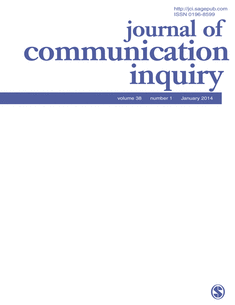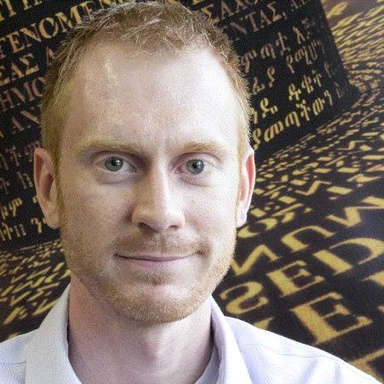What do Zero Dark Thirty, Indian print media, Wikipedia’s gender gap, teen girls’ Facebook profiles, and Hispanic advertising campaigns have in common? They’re all recent subjects of analysis in The Journal of Communication Inquiry (JCI).

The quarterly academic journal of media and communication studies is celebrating its 40th anniversary of continuous publication this April. JCI is run by students in the University of Iowa’s PhD program in journalism and mass communication, and is the official journal of the Critical/Cultural Studies Division of the Association for Education in Journalism and Mass Communication.
Founded in 1974, JCI publishes peer-reviewed scholarship on current issues in the field of media and communication studies, especially those related to race, gender, and ethnicity.
“Not only are we analyzing these topics themselves,” says John Haman, the journal’s book review section editor and a graduate student from Swisher, Iowa, “but we’re also analyzing how the public hears about them through different communication technologies, since that’s how people develop opinions.”
"To my knowledge, JCI is the only student-run, peer-reviewed academic journal in communication and media studies in the world."
—Gigi Durham, professor, UI School of Journalism and Mass Communication
JCI encourages alternative and interdisciplinary perspectives, with work often drawn from fields as diverse as psychology, philosophy, and political science. Each issue contains four to five peer-reviewed critical essays and one or two reviews of recently published books in the media and communications field. Print issues are released in January, April, July, and October. Online editions appear one month prior to each print issue.
“To my knowledge, JCI is the only student-run, peer-reviewed academic journal in communication and media studies in the world,” says Gigi Durham, professor in the School of Journalism and Mass Communication (SJMC) in the College of Liberal Arts and Sciences and the journal’s executive editor.

Each issue is crafted by the managing editor, who reads submissions and coordinates the peer-review process, which involves recruiting researchers to review promising manuscripts and communicating proposed edits to authors. This year’s managing editor is graduate student Shawn Harmsen from rural Clinton County, Iowa. Harmsen notes that editing the journal is a challenging but invaluable experience, as it has allowed him to gain inside knowledge of a process central to academic research and publishing.

Haman, who’ll take over for Harmsen this summer, agrees. “Most of us who have submitted to a journal don’t have a view from inside the process, an understanding of how the gears function.”
The managing editor is advised by the reviews editor and a five-member advisory board (three graduate students and two SJMC faculty members), who help to select themes for special issues and act as a sounding board for new initiatives.
“We as graduate students take a lot of pride in the journal,” Haman notes. “It’s a very prestigious tradition, a legacy. Your finger is really on the pulse of critical cultural studies when you’re on the staff of JCI.”
Second-year doctoral student Andrea Weare from Council Bluffs, Iowa, is JCI’s incoming book reviews editor and currently serves on the advisory board. “I’m really enjoying working with individuals who care deeply in their research about gender, sexuality, and racial equality,” she says.
Because it’s run by students, Durham says, the journal has always published cutting-edge, experimental, and unusual types of research, and has often been at the forefront of the field because of the students’ willingness to take risks. In the words of Ed McLuskie, the journal’s first editor and a 1975 UI PhD, “JCI has a reputation as a space for fresh academic air.”
Unlike most scholarly journals, JCI publishes reflective essays alongside more traditional styles of academic research.
“We want people to hash out critical issues on our pages,” says Harmsen, recalling a recent article on the gender imbalance among Wikipedia editors (most of whom are male) that explored the questions, “Who controls information? How? Why?”
“You can go back through our 40 years of issues and see these debates, scholars grappling with ideas like, ‘What is justice? Why are certain people exploited? How are people resisting the system?’”
The April issue will include articles on adventurous role models for girls 50 to 70 years ago, the debate surrounding the decision to open up Indian print media to foreign investment, and white masculine supremacy in the Hollywood blockbuster 300. A guest introduction by McLuskie (currently a professor at Boise State), will recall the journal’s “fragile opening years,” when it struggled with funding and intellectual orientation. “It was by no means certain the journal would someday celebrate a 40th anniversary as a student-edited publication,” he writes.
Today, the Journal of Communication Inquiry is a well-known, well-respected publication with consistent funding from a partnership between the School of Journalism and Mass Communication and the academic publisher Sage. It operates with a committed graduate student staff and has had many distinguished contributors through the years, including Edward Said, Angela McRobbie, and James Carey.
JCI was also the first American journal to publish the work of Stuart Hall, the pioneering UK-based theorist who in the 60s and 70s helped to create the academic field of cultural studies. The journal honored Hall’s recent passing by granting free online access to the April 1986 issue on cultural studies, which featured Hall’s work.
Harmsen says his work as managing editor is “an honor, but also a solemn responsibility”—though he admits that there are moments of joy, too. “It’s fun to read brand-new research,” he says. “I get excited when I finish reading an article and say, ‘That was really clever! I can’t wait to publish this!’ Those are the articles you really live for.”
For her part, Weare says she’s learning “how important research and ideas are communicated to other people interested in solving similar cases on their own campuses.”
Harmsen’s final issue as managing editor, due out in October, will feature articles about the LGBTQ community’s political and cultural battle for equality. Haman says his plans for the following year include publishing new research on subcultures and expanding the reach of the journal, possibly through social media and podcasts.
Subscribe or read a sample issue here
Follow JCI on Facebook or on Twitter: @JCI74